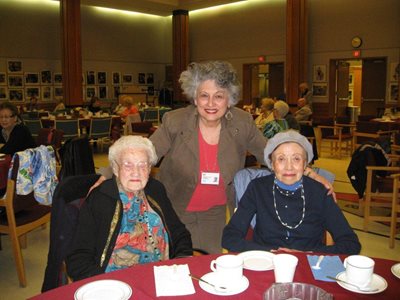
Holocaust Resource Program
The Holocaust Resource Program provides services for clients, families and survivors who live at Baycrest, in other long-term care facilities or in the wider community.
The following support groups for child survivors and children of survivors are run by specially trained staff.
Café Europa is a monthly social drop-in program for Holocaust survivors who live in the community outside Baycrest. It is for people who survived concentration camps, labour camps, exile or hiding or who were members of resistance groups.
The program includes lectures, discussions, music and an opportunity to visit with old and new friends. Kosher refreshments are provided.
A social worker runs the program and is available to all participants.
Date and time
Fridays 10 a.m. to noon
Location
Wortsman Hall
Baycrest
3560 Bathurst St.
Phone 416-785-2500 ext. 2259 for more information.
Cost
Free
This is a support and discussion group for survivors who were 17 years of age or younger when the war ended.
Phone 416-785-2500 ext. 2259 for more information.
This is a support and discussion group for children of Holocaust survivors. Participants share their experiences, identify their needs and discuss ideas for helping themselves and their aging parents.
Phone 416-785-2500 ext. 2259 for more information.
Baycrest’s expertise in caring for aging Holocaust survivors is available in a practical manual for health-care professionals, support staff and families of survivors.
The Holocaust Survivors Care Guide teaches caregivers about caring for this special population. The advice and strategies in this guide can also be adapted to help victims of other wars or genocides.
Topics include challenges that may bring up difficult memories, potential triggers and communicating with survivors. There is also a section for family caregivers that offers advice for dealing with stress and tension.
Contact
Phone: 416-785-2500 ext. 2259